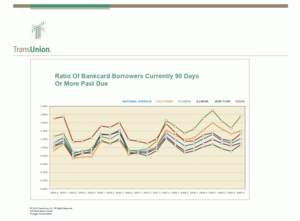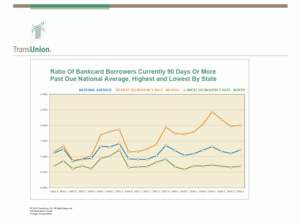CHICAGO, IL--(Marketwire - February 22, 2010) - TransUnion's quarterly analysis of trends in the credit card industry revealed that the national credit card delinquency rate (the ratio of bankcard borrowers 90 days or more delinquent on one or more of their credit cards) increased to 1.21 percent in the fourth quarter of 2009, up 10 percent over the previous quarter. Year over year, credit card delinquencies remained flat.
The report is part of an ongoing series of quarterly consumer lending sector analyses focusing on credit card, auto loan and mortgage data available on TransUnion's Web site. Information for this analysis is culled quarterly from approximately 27 million anonymous, randomly sampled, individual credit files, representing approximately 10 percent of credit-active U.S. consumers and providing a real-life perspective on how they are managing their credit health.
Quarterly Statistics
As expected, incidence of credit card delinquency was highest in Nevada (2.00 percent), followed closely by Florida (1.75 percent) and Arizona (1.62 percent). The lowest credit card delinquency incidence rates were found in Alaska (0.67 percent), North Dakota (0.69 percent) and South Dakota (0.74 percent). Mississippi saw the largest quarter-over-quarter increase of 21.1 percent in credit card delinquency. However, there were some bright spots in the fourth quarter as seven states saw a drop in their credit card delinquency incidence rates.
Average credit card borrower debt (defined as the aggregate balance on all bank-issued credit cards for an individual bankcard borrower) drifted downward nationally by 3.18 percent to $5,434 from the previous quarter's $5,612, and down 5.15 percent compared to the fourth quarter of 2008 ($5,729). The highest state average credit card debt remains in Alaska at $7,328, followed by Tennessee at $6,823 and Alabama at $6,332. The lowest average credit card debt was found in Iowa ($4,139), followed by North Dakota ($4,318) and West Virginia ($4,448).
Unlike last quarter, no state showed an increase in average credit card debt from the prior quarter. The steepest decreases in average credit card debt over the previous quarter occurred in Nevada (-6.23 percent), Alaska (-4.8 percent) and Rhode Island (-4.4 percent).
U.S. Analysis
"The drop in credit card balances in the fourth quarter is due in part to the efforts of consumers to pay down their credit cards in response to continued financial uncertainty; they want to keep a credit cushion available for hard times, which unfortunately are faced by many consumers these days," said Ezra Becker, director of consulting and strategy in TransUnion's financial services business unit. "However, we do expect to see the increased balances due to holiday spending show up on credit files in the month of January."
From a nonpayment perspective, the downward trend in credit card delinquencies came to an end in the fourth quarter. "It is typical seasonality to see a rise in credit card delinquency during the holiday season, especially since the recession began," continued Becker. "Consumers use their available cash for holiday shopping, and in many cases do not have enough left over to pay their credit card bills from the previous month. The increase in delinquency between the third and fourth quarters of 2009 is in line with what TransUnion saw at the end of 2008.
"What's interesting at a more general level is that the national trends in credit card delinquencies over the course of this recession have not been all that closely correlated to the unemployment rate," said Becker. In the relatively mild recession of 2001 -- where unemployment rates were not even close to the levels seen today -- credit card delinquencies rose almost 25 percent. Over the course of this recession, credit card delinquency rates have not moved past the 1.36 percent level in the fourth quarter of 2007, which marked the beginning of the economic downturn.
"To a large extent, this is due to the fact that falling home values have motivated consumers with negative equity to walk away from their mortgage debt obligations in order to remain current on their credit cards. This is a fundamental shift in consumer behavior. As compared to the 2001 recession, we see that the payment hierarchy has flipped, now favoring non-mortgage debt," added Becker.
Forecast
"Assuming moderate GDP growth throughout 2010, TransUnion sees its national forecast for 90-day credit card delinquency rate for this year fluctuating up and down within nominal ranges, but coming in at the end of the year below 1.2 percent," said Becker.
At the state level, Nevada is expected to experience the highest delinquency rate by the end of 2010 (1.96 percent), while Alaska is anticipated to show the lowest delinquency rate (0.64 percent).
TransUnion's Trend Data database
The source of the underlying data used for this analysis is TransUnion's Trend Data, a one-of-a-kind database consisting of 27 million anonymous consumer records randomly sampled every quarter from TransUnion's national consumer credit database. Each record contains more than 200 credit variables that illustrate consumer credit usage and performance. Since 1992, TransUnion has been aggregating this information at the county, Metropolitan Statistical Area (MSA), state and national levels. For the purpose of this analysis, the term "credit card" refers to those issued by banks.
About TransUnion
As a global leader in credit and information management, TransUnion creates advantages for millions of people around the world by gathering, analyzing and delivering information. For businesses, TransUnion helps improve efficiency, manage risk, reduce costs and increase revenue by delivering comprehensive data and advanced analytics and decisioning. For consumers, TransUnion provides the tools, resources and education to help manage their credit health and achieve their financial goals. Through these and other efforts, TransUnion is working to build stronger economies worldwide. Founded in 1968 and headquartered in Chicago, TransUnion employs associates in more than 25 countries on five continents. www.transunion.com/business
Graphics and/or photographs to accompany this release can be obtained by members of the media by contacting Cliff O'Neal at 312-985-2540 or coneal@transunion.com or Dave Blumberg at 312-985-3059 or dblumbe@transunion.com.
Contact Information:
Contact:
Dave Blumberg
TransUnion
E-mail:
Telephone: 312 985 2540

